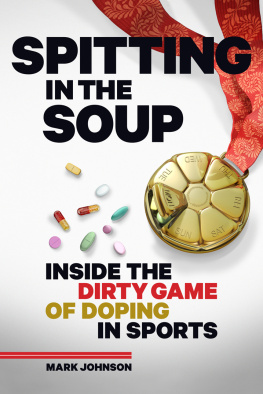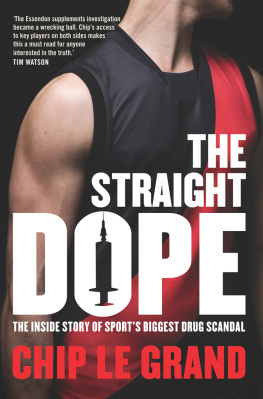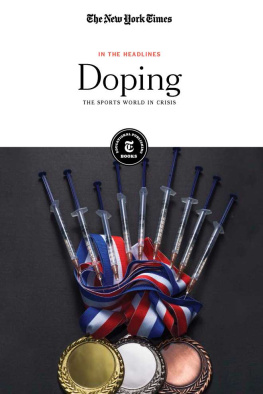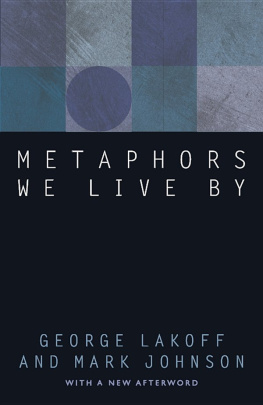Mark Johnson - Spitting in the Soup: Inside the Dirty Game of Doping in Sports
Here you can read online Mark Johnson - Spitting in the Soup: Inside the Dirty Game of Doping in Sports full text of the book (entire story) in english for free. Download pdf and epub, get meaning, cover and reviews about this ebook. year: 2016, publisher: VeloPress, genre: Romance novel. Description of the work, (preface) as well as reviews are available. Best literature library LitArk.com created for fans of good reading and offers a wide selection of genres:
Romance novel
Science fiction
Adventure
Detective
Science
History
Home and family
Prose
Art
Politics
Computer
Non-fiction
Religion
Business
Children
Humor
Choose a favorite category and find really read worthwhile books. Enjoy immersion in the world of imagination, feel the emotions of the characters or learn something new for yourself, make an fascinating discovery.
- Book:Spitting in the Soup: Inside the Dirty Game of Doping in Sports
- Author:
- Publisher:VeloPress
- Genre:
- Year:2016
- Rating:3 / 5
- Favourites:Add to favourites
- Your mark:
- 60
- 1
- 2
- 3
- 4
- 5
Spitting in the Soup: Inside the Dirty Game of Doping in Sports: summary, description and annotation
We offer to read an annotation, description, summary or preface (depends on what the author of the book "Spitting in the Soup: Inside the Dirty Game of Doping in Sports" wrote himself). If you haven't found the necessary information about the book — write in the comments, we will try to find it.
Spitting in the Soup: Inside the Dirty Game of Doping in Sports — read online for free the complete book (whole text) full work
Below is the text of the book, divided by pages. System saving the place of the last page read, allows you to conveniently read the book "Spitting in the Soup: Inside the Dirty Game of Doping in Sports" online for free, without having to search again every time where you left off. Put a bookmark, and you can go to the page where you finished reading at any time.
Font size:
Interval:
Bookmark:


Copyright 2016 by Mark Johnson
All rights reserved. Published in the United States of America by VeloPress, a division of Competitor Group, Inc.

3002 Sterling Circle, Suite 100
Boulder, Colorado 80301-2338 USA
(303) 440-0601 Fax (303) 444-6788 E-mail
Distributed in the United States and Canada by Ingram Publisher Services
A Cataloging-in-Publication record for this book is available from the Library of Congress.
ISBN 978-1-937715-27-4
eISBN 978-1-937716-82-0
For information on purchasing VeloPress books, please call (800) 811-4210, ext. 2138, or visit www.velopress.com.
Art direction by Vicki Hopewell
Cover: design by Andy Omel; concept by Mike Reisel; illustration by Jean-Francois Podevin
v. 3.1
For my parents, who granted me a love
for outdoors and library alike
CONTENTS
The story of doping in sports is packaged for easy consumption. As it goes, morally degenerate athletes cheat to win. Get rid of these creeps and sport settles back into a state of pure fair play. The falls of cheaters like Lance Armstrong, Ben Johnson, and Barry Bonds are object lessons topped with gratifying dollops of schadenfreude. The very presence of such deviants in elite competition is an affront to the rest of us who dont take shortcuts, and their collapse pleases us by confirming our own moral superiority.
But this tidy primary school version of events is itself a fraud. Like viewing the Grand Canyon through a toilet-paper tube, its good-versus-evil reductionism leaves out layers of historical context and economic sedimentationmost glaringly by ignoring the fact that drug-free play is a relatively recent moral precept forced upon sports whose participants have always been chemically enhanced. While every doping athlete is responsible for his or her own decisions, the story of doping in sports is more complex than solo agents cheating their way to the podium. In fact, the imposition of quasi-religious values regarding personal and moral cleanliness is a relatively new invention that elite sports are still struggling to adopt. This book attempts to unpack some of the complexity that gets lost when a sportswriter has to meet the constraints of space and deadlines, or when a politician needs to appeal to the fearful instincts of his constituents.
Maintaining a good-versus-evil understanding of doping in sport allows us to turn our heads from our own role as members of a society that embraces performance-enhancing drugs and procedures. As I explore in this book, fans, athletes, governments, sports organizing bodies, and advertisers are all complicit in the championing of chemistry in the service of greater happiness and performance in life.
This context matters when considering doping in sports. The use of performance-enhancing drugs ultimately comes down to individual decisions, but to understand those choices, it helps to take into account contemporary societys gargantuan thirst for performance-enhancing drugs and procedures, as well as nearly 150 years of organized sports historyduring two-thirds of which doping was not contrary to what we now call the spirit of sport.
Of course, when we dope in the course of our daily lives, we are (usually) not breaking any rules. Taking erythropoietin (EPO) to get ahead in a bike race is illegal, but popping a prescribed amphetamine like Adderall to improve focus and stamina in school or the workplace violates no regulations. Nor does taking Viagra to improve sexual performance. American society has repeatedly statedvia its embrace of direct-to-consumer drug pitches on television and its hands-off approach to a supplement industry that does over $30 billion in annual sales, as well as its massive spending on cosmetic enhancement proceduresthat it likes drugs that make us better than well, and it likes lots of them, thank you very much.
Today, Americans use more prescription stimulants than during the post-Vietnam speed epidemic, and over 6 million of these users are aged 4 to 17. This industrial-scale doping of American youth in the interest of better mental focus and higher output suggests that while anti-doping missionaries might claim performance-enhancing drugs are immoral and that regulators know what is best for people, in practice, Americans take a more pragmatic stance. Their attitudes regarding performance-enhancing drugs outside of sports suggest that what is moral is not what is most chemically pure, but rather what is most productive.
While much of the daily coverage of doping in Olympic sports focuses on the drugs taken and the people who took them, the larger, more interesting, and most useful story is the context, the social values, and the historical events that shaped our contradictory responses to performance-enhancing drugs and technologies in sport and everyday life. The forces at play are as wide-ranging as the politics of national defense, the economics of sponsorship, insecurities over global empire and personal appearance, pharmaceutical marketing, and the redefinition of aging from a matter of fate to one of choice that empowered consumers can bend given the right medical technology.
Further, the wall between sports and society is permeable; the behavior of athletes affects the buying and drug-taking decisions of fans, and the political actions of fans can alter what athletes do behind closed doors. This book attempts to give a better understanding of this complicity and why it has never been in the interest of athlete, fan, or journalist to spit in the soup that feeds us all with the nourishing sustenance of money, entertainment, andin the case of the Olympic Gamespolitical clout.
Beginning with the ideals espoused by French aristocrat and Olympic founder Pierre de Coubertin, which were based on the chivalric romances he liked to read and his admiration for British public schools, in the 19th century, amateur sport was burdened with the idea that it could become a morally uncomplicated and uncompromised space in the midst of a fallen world. At the heart of this fantasy was the idea of amateurismthe belief that sport is the domain of the aristocratic leisure class, sealed off from the morally and genetically corrupted lower classes. When future Olympic managers came to realize the economic potential of the five rings, they eventually abandoned Coubertins idea of preserving the spirit of sport and fair play in the amber of amateurism. Over time, the battle against professionalism in the Olympics was replaced by a war against drugs. And this new struggle to keep sports pure was itself an echo of larger social anxieties about countercultural social and moral decay during the 1960s.
The rise of anti-doping concerns in the 1960s led to the emergence of a complex anti-doping infrastructure that today attempts to impose moral and physical purity on the sporting universe. With no actual Edenic state of fair play to refer back to, anti-doping moralists have fabricated notions of a pristine predrug era that their missionary efforts would resurrect. And to create a sense of fear to justify the sometimes human-rights-violating intrusions of an anti-doping infrastructure, anti-doping crusaders, with the help of the media, made up tales about the mortal dangers of drugs that were often out of proportion to their actual, clinically documented lethality.
This book investigates why the media and anti-doping infrastructure are also loath to spit in the soup that nourishes their own existence. For example, the story of European cyclists dying en masse in the 1990s from EPO is a mytha fabrication that neither the press nor anti-doping campaigners examined for truth. Admitting that no evidence existed conclusively linking EPO to a supposed rash of endurance athlete deaths would expose as fraud a story that in many respects justified the existence of anti-doping regulators and sensation-hungry reporters.
Next pageFont size:
Interval:
Bookmark:
Similar books «Spitting in the Soup: Inside the Dirty Game of Doping in Sports»
Look at similar books to Spitting in the Soup: Inside the Dirty Game of Doping in Sports. We have selected literature similar in name and meaning in the hope of providing readers with more options to find new, interesting, not yet read works.
Discussion, reviews of the book Spitting in the Soup: Inside the Dirty Game of Doping in Sports and just readers' own opinions. Leave your comments, write what you think about the work, its meaning or the main characters. Specify what exactly you liked and what you didn't like, and why you think so.











